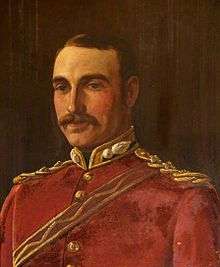Joseph Bradney
| Joseph Alfred Bradney | |
|---|---|
 Bradney as a lieutenant of the Royal Monmouthshire Royal Engineers Militia in 1885. | |
| Born |
11 January 1859 Greet, Tenbury Wells, Shropshire, England |
| Died |
21 July 1933 (aged 74) Monmouth, Monmouthshire, Wales |
| Allegiance |
|
| Service/ |
|
| Years of service | 1882–1918 (36 years) |
| Rank | Colonel |
| Commands held |
|
| Battles/wars |
|
Colonel Sir Joseph Alfred Bradney, CB, FSA, BA, JP, DL (11 January 1859 – 21 July 1933) was a British soldier, historian and archaeologist, best known for his multivolume A History of Monmouthshire.
Life
Joseph Bradney was born at Greet, Tenbury Wells, Shropshire, and educated at Harrow and Trinity College, Cambridge.[1] He acquired, partly by inheritance and partly purchase, Tal-y-coed Court, an estate at Talycoed, Llanvihangel-Ystern-Llewern, near Monmouth, where he settled at an early age.[2] He entered the army, serving as captain of the Royal Monmouth Engineer Militia from 1882 to 1892, and lieutenant-colonel commanding the 2nd Battalion, Monmouthshire Regiment from 1892 to 1912. In the Territorial Force Reserve from 1912 to 1919, he served in France in 1917-18.[3]
Bradney was High Sheriff of Monmouthshire in 1889, a county councillor from 1898 to 1924, and an alderman from 1924 to 1928.[2] He was also a governor and on the Council of the National Library of Wales and the National Museum of Wales. He was a member of the Royal Commission on the Ancient and Historical Monuments of Wales. He was appointed a Companion of the Bath in 1911, and knighted in 1924.[2][4]
He wrote extensively on the history of Monmouthshire, his major work being A History of Monmouthshire, published in four volumes comprising 12 parts, from 1904 until 1933.[2][5] A final fifth volume, drawing on his notes, was published posthumously. The books have been described as a "monumental survey, extensively illustrated and containing dozens of pedigrees, [which remain] a basic reference work essential for the serious study of local history or genealogy in Monmouthshire." He shared an interest in rude limericks with the antiquarian Egerton Phillimore though Bradney's letters to Phillimore were often written in latin.
He was married twice, first to Rosa Jenkins (d. 1927), and then to Florence Prothero.[4] A Latin tablet in the Church of St Michael and All Angels, Llanvihangel-Ystern-Llewern records his achievements.[6]
Works
- Genealogical memoranda relating to the families of Hopkins of Llanfihangel Ystern Llewern, Co. Monmouth, and Probyn of Newland, Co. Gloucester, 1889
- A History of Monmouthshire: From the coming of the Normans into Wales down to the present time, 4 vols, 1904-1933
- (ed.) The diary of Walter Powell of Llantilio Crossenny in the county of Monmouth, gentleman 1603-1654, 1907
- (ed.) Llyfr Baglan : or The book of Baglan, by John Williams, London: Mitchell, Hughes and Clarke, 1910
- A History of the Free Grammar School in the Parish of Llantilio-Crosseny in the County of Monmouh (1924)
References
- ↑ "Bradney, Joseph Alfred (BRDY877JA)". A Cambridge Alumni Database. University of Cambridge.
- 1 2 3 4 Sir Joseph Bradney, A History of Monmouthshire, ISBN 0-9520009-6-2
- ↑ 'BRADNEY, Col Sir Joseph (Alfred)', Who Was Who, A & C Black
- 1 2 Biography at Welsh Biography Online
- ↑ http://arcw.llgc.org.uk/anw/get_collection.php?inst_id=1&coll_id=21&expand=
- ↑ Newman 2000, pp. 296-7.
Sources
- Newman, John (2000). Gwent/Monmouthshire. The Buildings of Wales. London: Penguin. ISBN 0-14-071053-1.
External links
- Works by or about Joseph Bradney in libraries (WorldCat catalog)
- "Archival material relating to Joseph Bradney". UK National Archives.
